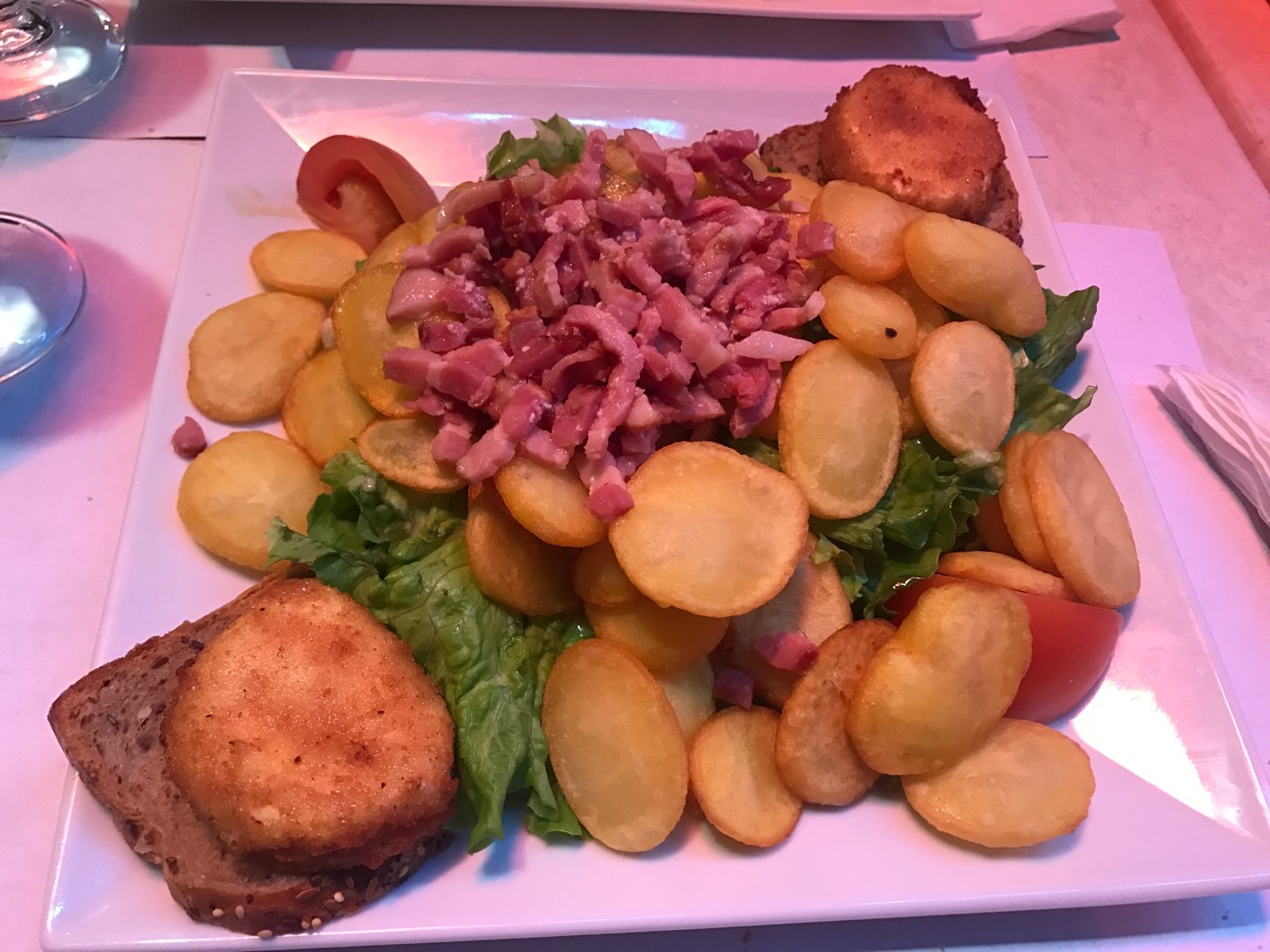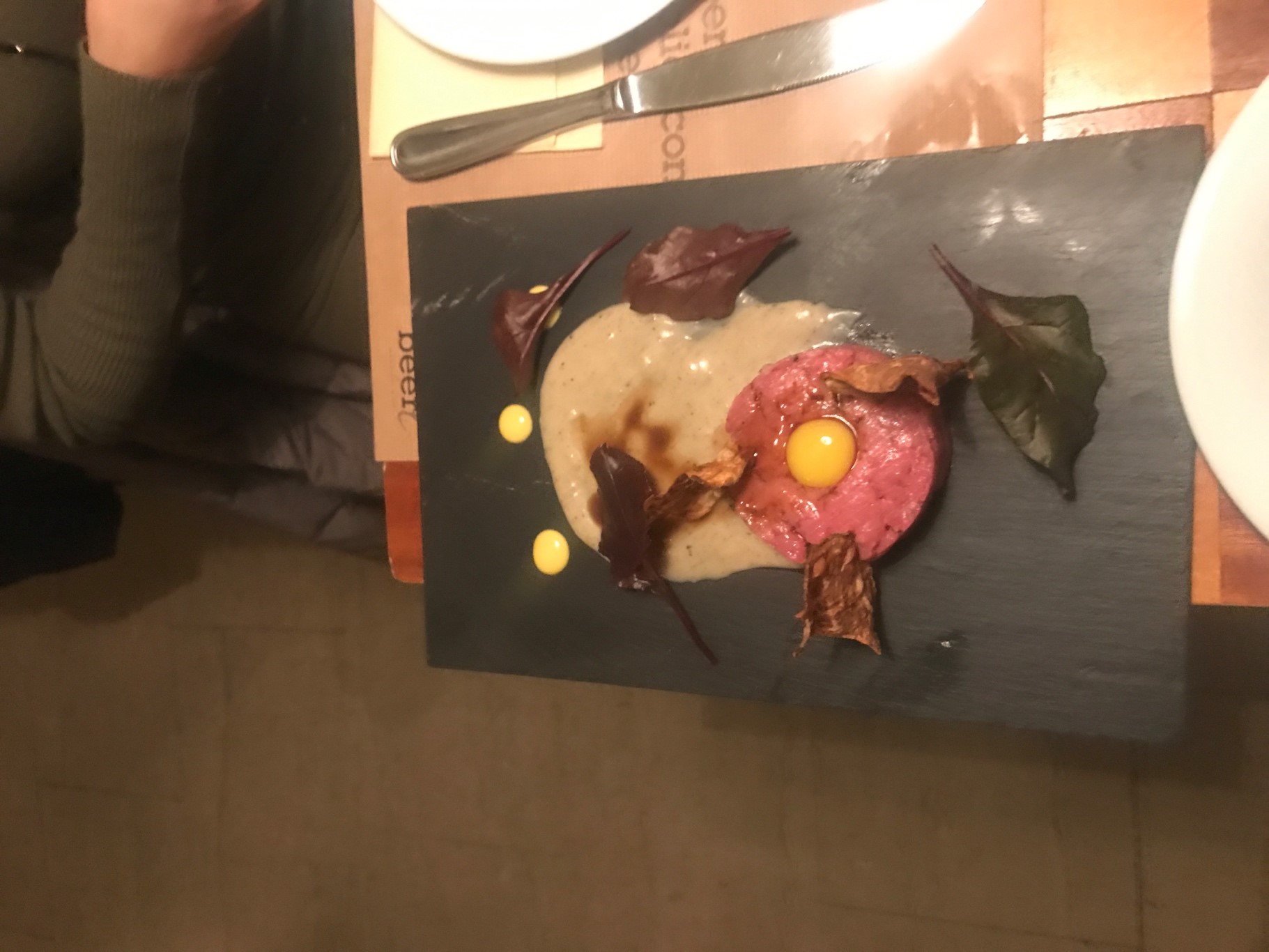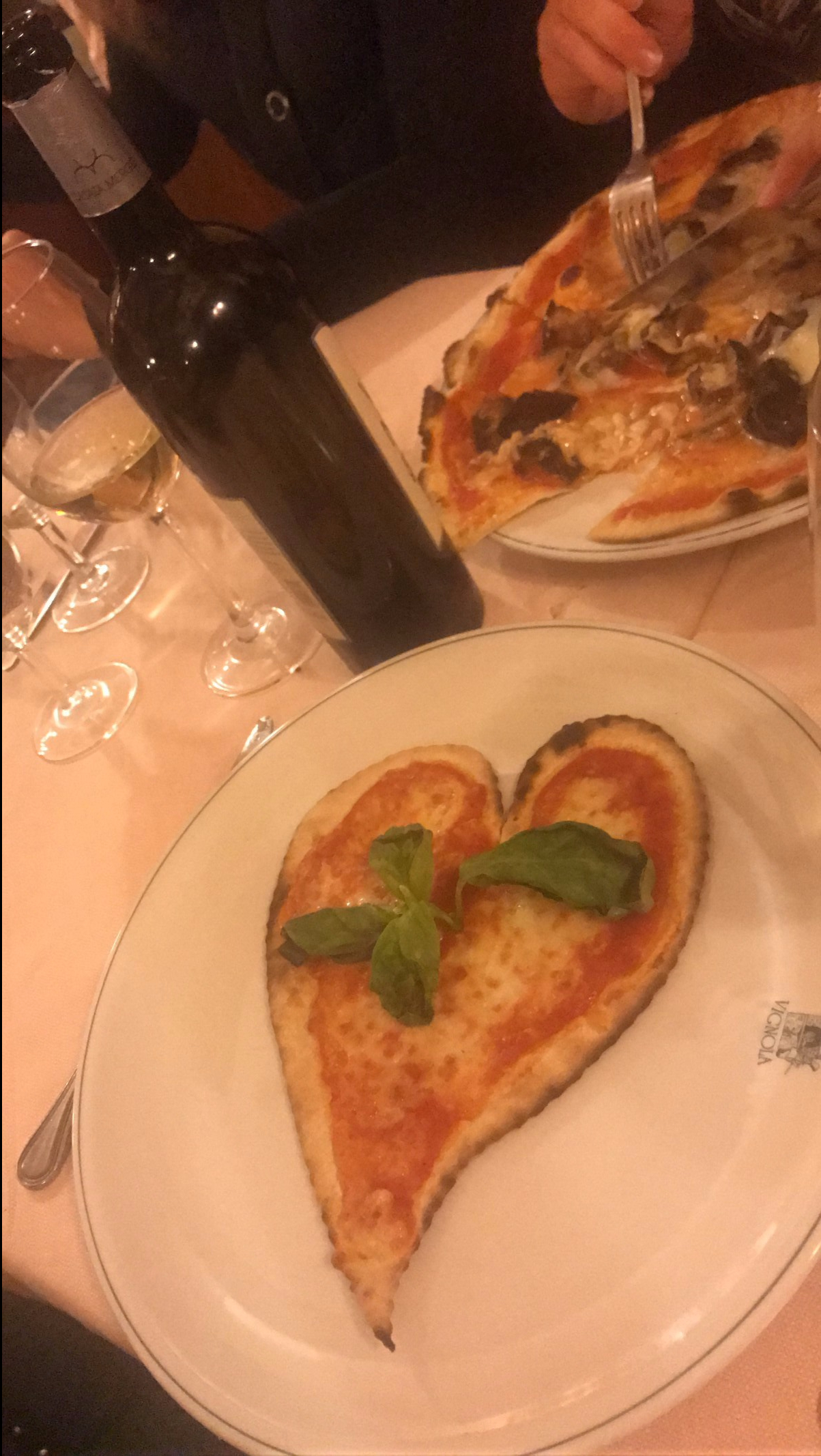“The meaning of food is an exploration of culture through food. What we consume, how we acquire it, who prepares it, who’s at the table, and who eats first is a form of communication that is rich with meaning.” (PBS, The Meaning of Food, 2005)
One of the first blog posts I wrote during this experience shared that I had many preconceptions about France, its people, and its culture. I feared an ability to relate to my host country and wondered whether I’d ever assimilate. Turns out, a major foundation of French culture includes food, one of my favorite topics and parts of exploring different cultures! After all, “the meaning of food is an exploration of culture through food.” While I had heard a lot about popular French foods like escargot (snails), des cuisses de grenouille (frog legs), and foie gras (fattened goose liver), these seemed to repulse me. I was quite excited to come and explore the wide variety of French wine and cheese, two of its most famed cultural staples. Before studying abroad, French food seemed to be just alright – not perfect, but not horrible, so I have to say how surprised I am that I feel much differently now.

One of my favorite things in France is café culture. I stopped in Paris during my sightseeing to enjoy this beautiful lunch of a chevre chaud (warm goat cheese) salad.
My first night in Reims, I went out for the meal that would set up my obsession with exploring French cuisine. I ate at a café called Le Gaulois, located in the city center. My first meal was a linguine pasta with duck, in a rich creamy peanut sauce. My friend Nick insisted I indulge in a glass of champagne from the region, its dryness perfectly complementing the rich sauce of the duck. For dessert, we shared chocolate mousse and ice cream with traditional cookies, and I made it my goal then and there to try as much French cuisine as I could. Nick and his mother ordered foie gras and chevre, two specialties they had me try then and there. Although foie gras wasn’t a big deal to me, it wasn’t gross like I expected. The chevre (goat cheese, this time prepared warm with honey) was immaculate. I began to understand why UNESCO protects French food under world heritage – it is an experience of sorts that everyone should have if they travel to France.

Amazing appetizers from Le Café Gaulois in Place d’Erlon. On the left, we have cooked foie gras on a bed of toast and lettuce, drenched in sweet and salty honey-balsamic sauce. On the right, we have snails (!) in an herb sauce with a regional name.

Magret canard, which is a style of duck, in a very delicious savory sauce with cooked black peppercorns and pasta on the side. (Le Café Gaulois)

One of my favorite meals: a salad with chevre chaud (warm goat cheese). I love this particular restaurant because of its elaborate salads. This one includes jambon pays (the country’s shredded ham) and potatoes lightly fried. (Le Café Gaulois)
It’s been exactly two months and 11 days since that first meal, and since then I’ve propelled myself into French food culture. Despite my homesickness for New York City and all the available cuisines there, I’ve found it comforting to adapt to French culture via food. Bakeries are a huge deal here, and the freshness of the bread and pastries makes my mornings and/or lunches. Even the “fast food” options here (which consist of Arab kebabs and European pizza among other things) have special tastes that I feel I will remember when I go back home.

From Hanny Kebab, a staple in my life here since my first week. Kebabs traditionally include meat, red onions, tomatoes, lettuce, and sauces of your choice. My favorite is sauce blanche (white sauce).
On the nights where I decide to splurge and explore the city as well as some restaurants, I like to eat lavish meals complete with dessert and drinks to try new things. Through this exploration, I’ve developed a serious affinity towards stinky cheeses, weirdly prepared meats like tartare (completely raw meat!), and large salads with French lardon and chevre.

Beef tartare served with dried fungus (mushrooms) and a savory cream and pepper sauce.
The majority of my new friends here are fellow exchange students, and many of them share similar sentiments as me. Most of us terribly miss our lives back home, and for us, we remember our foods back home as staples of our culture. However, all of us have been rather excited to explore French cuisine and make a steady effort to both cook dishes that mean something to us back home as well as participate in French food culture. In order to do so, some of my close friends and I have formed a dinner group, something I would sincerely recommend to other students studying abroad. In our group of friends, we have a variety of nationalities present. We are American (Northern, Midwest, and Southern), Mexican, German, New Zealanders, and Lebanese, just to name a few. Every week we dine together at someone’s home, and one of us makes a cuisine of their culture to share with the others. Besides this, we’ve held “French” nights where we gather to eat baguettes and cheese, or go out to explore the local food. These meetings have become quintessential.

Photo taken in my apartment, when my friends and I gathered after our morning classes to make an elaborate brunch. We combined yummy French foods like baguettes and comte with and avocado spread and lightly fried eggs.
To give some more insight on the positives and negatives of adapting to a culture through food and drink, I’ve asked some of my friends to describe their experiences with French food and its culture. My friend Anna, like me, loves the bakeries. She says, “their pastries and baguettes are the best. No comparison to what I have had in New York.” Very often, Anna and I go grocery shopping together. She’s discovered that “the groceries (except for meat) are much cheaper.” When asked to comment on specifics, she said that meat here is super expensive but I am content with this because I would much rather have responsibly grown expensive meat than what we have in the United States.” Additionally, “most of the groceries here are also more fresh than the U.S.” Because Anna and I have a Caribbean background, there are some things that we can agree on that the French could do better to adapt to. Maybe this is because we are from NYC, one of the most diverse places in the world, but Anna noted that “the French have no sense of diverse food. What they believe to be diverse are cultural stereotypes,” something that we’ve seen a bit in even our own friends group. We made a joke that on the night our friend from Mexico City was to host dinner, everyone expected tacos for ‘Taco Tuesday,’ even though what she (and our other Mexican friends) made was impressive and delicious, to say the least. Anna went on to discuss seasoning, expressing sincere happiness that her mother remembered to pack her Dominican sázon, which she could not find here. On the overall experience, she writes that it is “difficult being accustomed to having different cultural experiences with food.” Anna and I are very similar as New Yorkers having to adapt to French tastes and culture, but the respect for the food system in France is immense from both of us.

Some of my and Anna’s favorite pastries from a bakery near our school. The cake pictured above is a lovely creamy and flaky cake, served with almonds and powdered sugar on top. The two little tarlettes are lemon meringue and fruit (left to right). We hope to continue spoiling ourselves like this as much as we can while here!
Our friend Rea, unlike Anna, was not too shocked with French food or quality. “French food was not much of a cultural shock for me because I am Lebanese and French food and culture is embedded in Beirut. I learned, ate, and read French which still living in a conventional Lebanese cultural setting. I think the French influence is a big positive add-on to the life of the Lebanese.” Rea recommends to try cultural mixing, by dipping a French baguette in traditional Lebanese hummus.
One student here from Australia, Claudia, is living with a homestay family, something not common in our group of friends. In fact, she is the only one (that I know of) in my program who took the homestay option. Most of us have our own apartments with or without roommates, or live in student housing. Claudia’s experience with French food and culture have thus been a bit more intimate. She says that “from my point of view, the meals I share with my host family are as close as I will ever get to French culture.” She enlightens me on the true meaning of French food in culture by saying that “it’s more than just the classic baguette with cheese and good wine…in fact, it doesn’t really have a lot to do with what you’re eating, as long as you can talk about how good it is.”
I absolutely agree with Claudia in the fact that the French take immense pride in the small pleasures of life, including food. A well-prepared shared meal is an excuse to hang out and have good experiences. This is something I notice especially when I go out to eat, and unlike in NYC, staff do not seem to rush your dining experience at all. You are asked whether you want more time in between courses, and waitstaff do not come to your table repeatedly to ask if you need anything, are finished, or need the check. This is something to note – it is not rude to not be hyper-attentive to a table… rather, it is seen as a sign of respect that the people dining want to take their time and enjoy their experience.
Coming back to Claudia’s family, she tells me that “they are a very traditional Catholic family, who eat a big Sunday lunch every week. It’s often roasts with veggies, or something similar, and last for hours… it always involves more than one course.” Although Claudia says she doesn’t go out to eat much, I feel her experience with a traditional French family perfectly showcases the importance of intimate meals with those you care about.
Coming back to the quote that inspired this blog post: “what we consume, how we acquire it, who prepares it, who’s at the table, and who eats first is a form of communication that is rich with meaning.” Everything that I’ve learned about French cuisine and its preparation – a focus on sustainability, the international protection of its culinary customs through UNESCO, the different means of preparation for the thousands of varieties of cheese, wines, breads, and meats they have – has proven to me that the French have a deep connection with what they consume, and only enjoy the finest things. Even simple foods, like bread and cheese, have such rich flavors and come in a variety of options, that you can’t help but think the French are very deliberate with what and how they eat. In this culture, especially with the affordability of good cuisine and its wide availability with pastries and specialty food shops on nearly every corner, it is reasonable to say that everyone deserves to eat well. And any culture that has food so deeply embedded, and considers the pleasure of eating a necessity to life, is a culture that I would consider myself enamored with.

Yummy Italian pizza from a restaurant I visited over spring break… my friend’s sister is a regular there, and I guess the chef adores them as much as I adore food!



